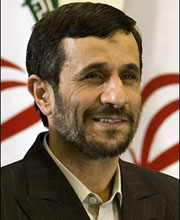Muted reaction of world leaders to Iranian election
 The international reaction to Iran's controversial presidential election was muted at best on Saturday with few world leaders making any statements on the contested result.
The international reaction to Iran's controversial presidential election was muted at best on Saturday with few world leaders making any statements on the contested result.
Mahmoud Ahmadinejad was re-elected as Iranian president with more than 62 per cent of the vote, sparking accusations of fraud from his main rival Mir-Hossein Moussavi.
Supreme Leader Ayatollah Ali Khamenei confirmed the result and called Ahmadinejad, "president of all Iranians." There was widespread unrest in Tehran as Moussavi's supporters clashed with police, and hundreds of people carried banners that said, "Where's my vote?"
The US response was guarded, with Secretary of State Hillary Rodham Clinton saying Washington hoped the results of the presidential election reflected the will of the Iranian people, adding that the US would continue to follow developments there.
"We obviously hope that the outcome reflects the genuine will and desire of the Iranian people," Clinton said on the sidelines of a meeting with her Canadian counterpart in Ontario.
White House spokesman Robert Gibbs said the US would "continue to monitor the entire situation closely, including reports of irregularities."
Canadian Foreign Minister Lawrence Cannon said his country was deeply concerned over reports of alleged irregularities in the election.
In Russia, senior legislator Konstantin Kosachev expressed hoped that Ahmadinejad would show more willingness to compromise in his second term, reported the Interfax news agency.
"In his past term, he was often properly criticized and not always as comfortable a partner for Russia as we would wish," said Kosachev, head of the international affairs committee in the Russian parliament.
He also noted internal Iranian debates about the legitimacy of Ahmadinejad's victory, saying: "It will be important to check whether the presidential elections were truly free and democratic."
Arab League Secretary General Amr Moussa congratulated Ahmadinejad on his re-election, saying he hoped Arabs and Iranians could cooperate for the sake of peace.
In addition to expressing hope for Iranian cooperation in creating peace in the region, Moussa stated that "for the sake of the stability and security of the region, we hope to work together to rid the region of all weapons of mass destruction - including nuclear weapons."
The United Nation Security Council has passed a series of sanctions against Iran to pressure it to halt the uranium enrichment programme that could theoretically be used to produce material for nuclear weapons.
When asked about Arab relations with Iran during Ahmedinejad's first term, Moussa said, "When everyone talks about establishing dialogue, I think only then will we be able to achieve mutual understanding."
Less ambiguous statements were to be heard from the opposing sides in the Israeli-Palestinian conflict.
Fawzi Barhoum, spokesman for the Palestinian Islamic movement Hamas movement, hailed Ahmadinejad's victory, saying "the results of the elections in Iran show the wide public support for Iran's policy of challenge.
"The results also show that the official level in Iran succeeded in sponsoring and maintaining the people's interests and hopes and protecting them from the (Western) threats."
Barhoum said he hoped Iran "will continue supporting Hamas and boosting its staying power."
Hamas, which Israel says has most of its militants trained by Iranian militants, took control of the Gaza Strip in 2007.
Israeli Vice Premier Shilvat Shalom on the other hand stressed Iran's nuclear "threat" in the face of Ahmadinejad's victory.
Ahmadinejad's win "is exploding in the face of those who thought that Iran was built for true dialogue with the free world, including a cessation of its nuclear program," he said.
"The United States and the free world must re-evaluate the policy on Teheran's nuclear ambitions," Shalom told Israel Radio.
Earlier this week Israeli officials, speaking on condition of anonymity, had told reporters they would prefer Ahmadinejad to win despite his anti-Israel remarks and Holocaust denial.
Ahmadinejad's hardline stance and extremist remarks would help garner stronger world support for stopping the nuclear programme, they said. (dpa)